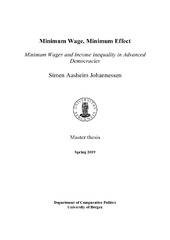Minimum Wage, Minimum Effect
Master thesis
Permanent lenke
https://hdl.handle.net/1956/20027Utgivelsesdato
2019-06-14Metadata
Vis full innførselSamlinger
- Master theses [117]
Sammendrag
Rising income inequality is one of the greatest challenges that advanced democracies currently face. This thesis analyses to what extent statutory minimum wages can contribute to tackling this challenge. In the existing literature this is debated, but recent empirical findings suggest that increasing the minimum wage reduces income inequality. But these findings are mostly based on the United States as well as developing countries. More research on developed countries is therefore important for policy makers when they discuss how to limit the growth in income inequality. This is exactly what this thesis does, by studying the effect of minimum wages in 28 OECD countries between 1995 and 2015, using time series cross-section analysis. In contrast to the existing literature, the results do not confirm that minimum wages limit growth in income inequality. In addition, this thesis analyses the effects of minimum wages on different parts (deciles) of the income distribution. This way I am able to examine what is behind the lack of an effect on overall inequality. In fact, the results show that even though raising minimum wages does increase the income earned by the poorest, it also reduces it for the second lowest group in the income distribution. Furthermore, higher minimum wages actually increase income in the eight richest decile. These results are consistent with theoretical arguments about how minimum wages can affect different parts of the income distribution, having to do with how employers respond to minimum wages as well as household composition.
